The real estate industry is experiencing a paradigm shift driven by technological advancements and evolving customer expectations. At the forefront of this transformation is the Customer Relationship Management (CRM) system, a powerful tool that is becoming indispensable in today's competitive market. As CRMs get smarter and more sophisticated with the integration of advanced technologies, their role in real estate is becoming more critical than ever. This blog explores the evolution and impact of CRM in real estate, the current state of CRM systems, emerging trends, and the future of CRM technology that will shape the industry's future.
Exploring the Evolution and Impact of CRM in Real Estate
-
The Current State of Real Estate CRM:
Generic CRM systems have been widely used across various industries for years. However, the specific needs of the real estate sector have led to the development of specialized real estate CRMs that offer unique features and functionalities tailored to this market. Unlike generic CRMs, real estate CRMs focus on managing property listings, tracking client interactions, automating marketing campaigns, and handling documentation processes specific to real estate transactions.
-
Key Features of Real Estate CRM:
Real estate CRMs differentiate themselves with several key features:
- Property Management: Allows for efficient handling of property listings, including details on availability, pricing, and features.
- Lead Management: Tracks and nurtures leads from initial contact through to conversion.
- Marketing Automation: Automates email campaigns, social media posts, and other marketing activities.
- Client Interaction Tracking: Records all interactions with clients, ensuring a seamless and personalized experience.
- Document Management: Facilitates the storage and management of important documents, reducing paperwork and improving efficiency.
-
Customization and Flexibility in CRM Systems:
One of the significant advantages of modern real estate CRMs is their customization and flexibility. Customizable dashboards and reports allow real estate professionals to tailor the CRM to their specific needs, ensuring they can access and analyze the most relevant data. This flexibility is crucial in shaping the future of CRM software, whether it's a large agency or a small independent broker.
Moreover, the time it takes to set up a CRM system is a crucial factor. The quicker a CRM can be implemented and configured, the sooner a real estate business can start reaping the benefits. This immediacy is essential in the fast-paced real estate market, where delays can lead to lost opportunities.
Emerging Trends in Real Estate CRM
As technology continues to evolve, several emerging trends are shaping the future of real estate CRM:
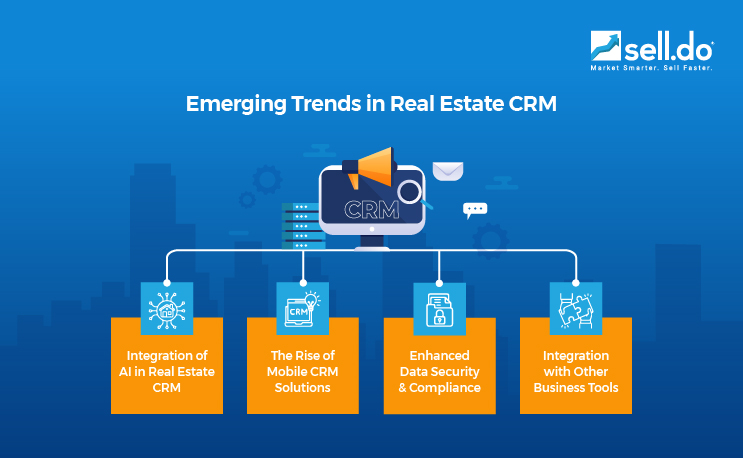
-
Integration of AI in Real Estate CRM:
The integration of Artificial Intelligence (AI) in real estate CRMs is transforming the industry by enhancing productivity and optimizing various processes. One notable feature is the bulk dialling capability, which allows agents to reach out to multiple leads efficiently, significantly improving their productivity.
AI also introduces advanced automation and personalization functionalities that revolutionize how real estate professionals interact with their clients. Here are some key AI functionalities integrated into modern real estate CRMs:
- Sales Automation.
- Marketing Automation.
- Personalization.
- Predictive Analytics.
- Chatbots and Virtual Assistants.
-
The Rise of Mobile CRM Solutions:
With the increasing reliance on mobile devices, mobile CRM solutions are becoming more prevalent. These solutions allow real estate professionals to access critical information and manage their tasks on the go, ensuring they can respond to clients promptly and efficiently, regardless of their location.
-
Enhanced Data Security and Compliance:
Data security is a top priority in real estate, where sensitive client information is handled regularly. Advanced real estate CRMs incorporate robust security measures and ensure compliance with data protection regulations, providing peace of mind for both businesses and their clients.
-
Integration with Other Business Tools:
CRM's ability to integrate with other business tools is a game-changer for real estate professionals. Integrating CRMs with communication platforms, real estate portals, and other business tools creates a unified platform for all business operations. This integration enhances efficiency by centralizing data and streamlining workflows, allowing for better coordination and communication across the organization.
Benefits of Adopting Advanced CRM Solutions
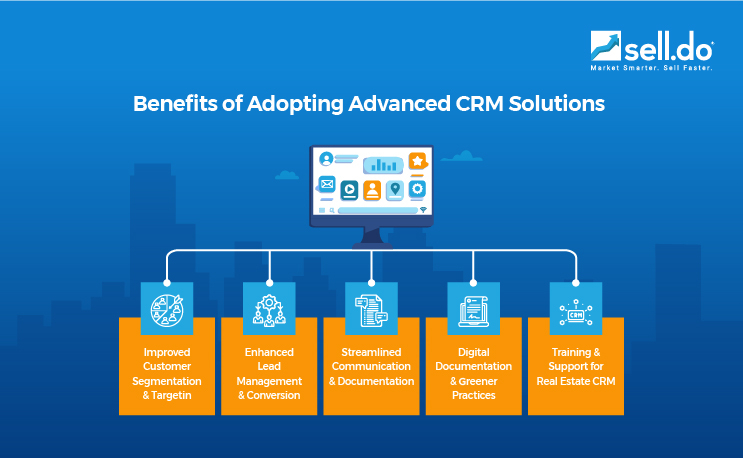
-
Improved Customer Segmentation and Targeting:
Advanced CRM solutions enable better customer segmentation and targeting, allowing real estate businesses to identify and focus on high-potential leads. This targeted approach increases the likelihood of conversions and maximizes marketing efforts.
-
Enhanced Lead Management and Conversion:
Effective lead management is crucial in real estate. Advanced CRMs provide tools to track and nurture leads through the sales funnel, improving conversion rates and ensuring every lead is noticed.
-
Streamlined Communication and Documentation:
Real estate transactions involve extensive communication and documentation. CRMs streamline these processes, facilitating efficient and organized communication with clients and automating document management. This not only enhances productivity but also ensures a more professional client experience.
-
Digital Documentation and Greener Practices:
The shift towards digital documentation is not only more efficient but also greener. Reducing paper usage aligns with sustainable business practices and appeals to environmentally conscious clients.
-
Training and Support for Real Estate CRM:
Adopting a CRM system is only effective if users are well-trained and supported. Comprehensive training programs maximize CRM adoption and effectiveness, ensuring that all team members can utilize the system to its full potential. Additionally, knowledgeable and professional after-sales customer support is vital for addressing any issues and providing ongoing assistance.
Future Predictions for Real Estate CRM
-
Predictive Analytics and Sales Forecasting:
Predictive analytics is set to revolutionize real estate CRM by providing insights into future trends and behaviours. This capability allows for more accurate sales forecasting and strategic planning, helping businesses stay ahead of the curve.
-
Managing Remote Teams:
The growing importance of CRM in managing remote teams cannot be overstated. With remote work becoming more common, CRMs play a crucial role in ensuring seamless collaboration and communication among team members, regardless of their physical location.
Conclusion:
The future of Customer Relationship Management in real estate is bright. Advanced technologies and innovative features are transforming how real estate professionals manage their businesses and interact with clients. By embracing these advancements, real estate businesses can improve efficiency, enhance customer experiences, and stay competitive in a rapidly evolving market.
Considering CRM as a strategic investment is essential for any real estate business looking to thrive in the future. Sell.Do, a tailored real estate CRM solution, offers the features and capabilities needed to harness the power of CRM effectively. By staying informed about real estate future trends and integrating advanced technologies, businesses can position themselves at the forefront of the industry. Real estate future predictions indicate that the integration of AI and other advanced functionalities will continue to shape the landscape. Request a demo today to see how it can revolutionize your real estate business and help you stay ahead in the competitive landscape.
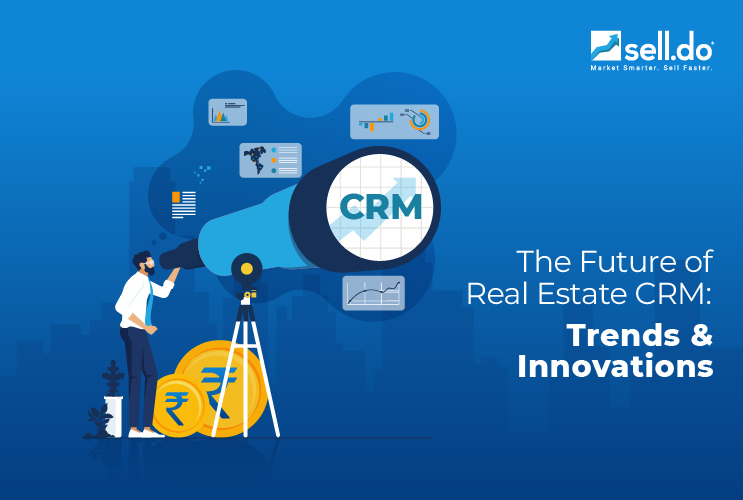


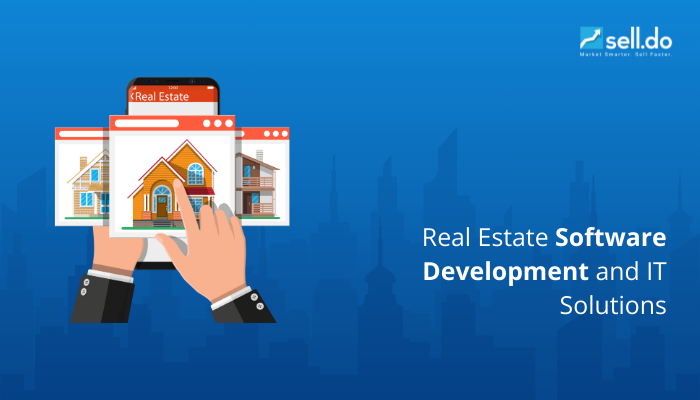

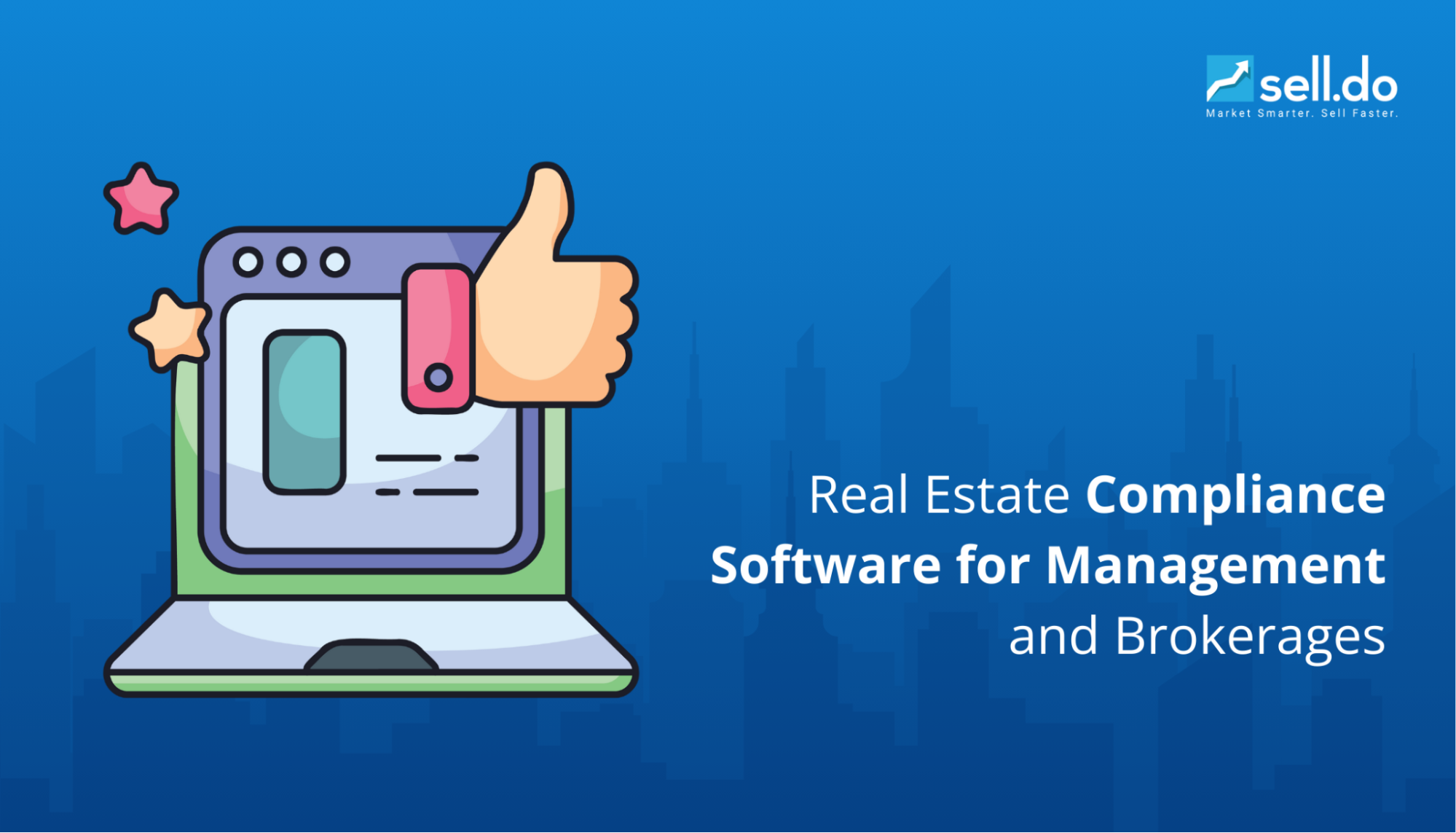
Leave a comment
Comments (0)
Be the first one to comment.